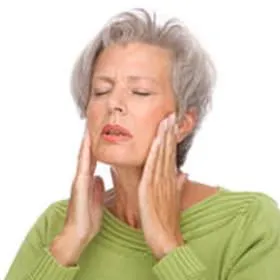(TMJ)
Temporomandibular Joints
"One of the most commonly overlooked causes of TMJ pain is trauma to the upper neck and nervous system."
Temporomandibular Joints (TMJ)
The lower jaw hinges at the temporomandibular joints (TMJ), located in front of each ear. These most complicated joints in the body allow the lower jaw to open, close, rotate and slide. The TMJs are used over 5,000 times each day when we chew, swallow, yawn, smile, laugh, eat, and speak. The top row of teeth actually hinge when the skull rocks up and down on the top vertebrae in the neck.
The TMJ & Trigeminal Nerve
Movement of the left and right TMJs must be coordinated, working at the same time for the jaw to move properly. This movement is orchestrated by a complex set of muscles that are directly controlled by the body’s nervous system, specifically branches of the trigeminal nerve, which is one of the most complex and powerful nerves in the body. It feeds sensation and function to one’s jaws, face, tongue, sinus, palate, eyes, teeth, and lips. Since the trigeminal nerve feeds the jaw, it is closely associated with the function of the TMJ and is critical in the development of TMJ pain.
There is a delicate working relationship between the TMJ, the muscles that move the jaw, and the nerves that control these muscles. Therefore, healthy function of the TMJ system requires normal structure and function of both the temporomandibular joints and the trigeminal nerve.
Causes of TMJ Pain
One of the primary causes of TMJ pain and disorders is damage to the joint itself. Direct or indirect trauma can affect the TMJ and clearly cause pain and dysfunction. Motor vehicle accidents, sports injuries, and dental work have been shown to trigger TMJ disorders, but even subtle, repeated traumas like clenching the teeth, excessive gum chewing, nail biting, or cradling a phone between your shoulder and the side of your head can cause TMJ pain. One of the most commonly overlooked causes of TMJ pain is trauma to the upper neck and nervous system.
Trauma to the upper neck can cause a misalignment which results in pressure or irritation to the trigeminal nerve. This pressure can cause the muscles that control the jaw to malfunction, thereby changing the movement of the TMJ. The joints do not work properly because the disc is pinched while opening or closing the jaw, and the neck and shoulder muscles go into painful spasms during the normal process of eating, talking, laughing, or smiling.
Symptoms of TMJ Dysfunction
TMJ dysfunction occurs when the joint is misaligned or malfunctions. Over time, this abnormal wear and tear can cause irritation, inflammation, and eventually arthritis within the joint itself, all leading to TMJ dysfunction. The symptoms of TMJ dysfunction can appear suddenly after a trauma, or they may take years to develop.
The symptoms of TMJ vary from person to person and can affect one or both joints. Symptoms vary from mild to severe and may include:
- Clicking or popping of the joint
- Pain with or without chewing
- Locking of the jaw
- Toothache
- Facial and/or neck pain
- Headaches
- Earaches
- Tinnitis (ringing in the ears)
- Clogged or stuffy ear

